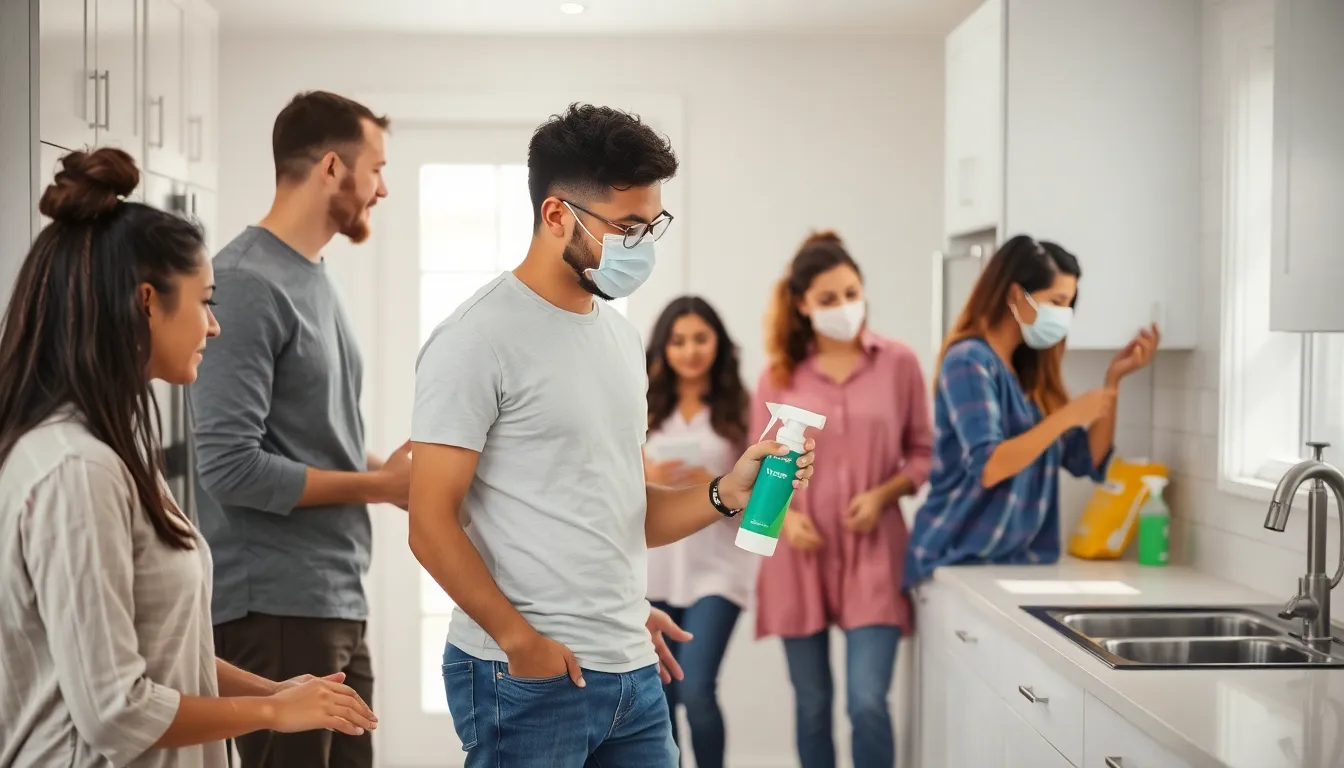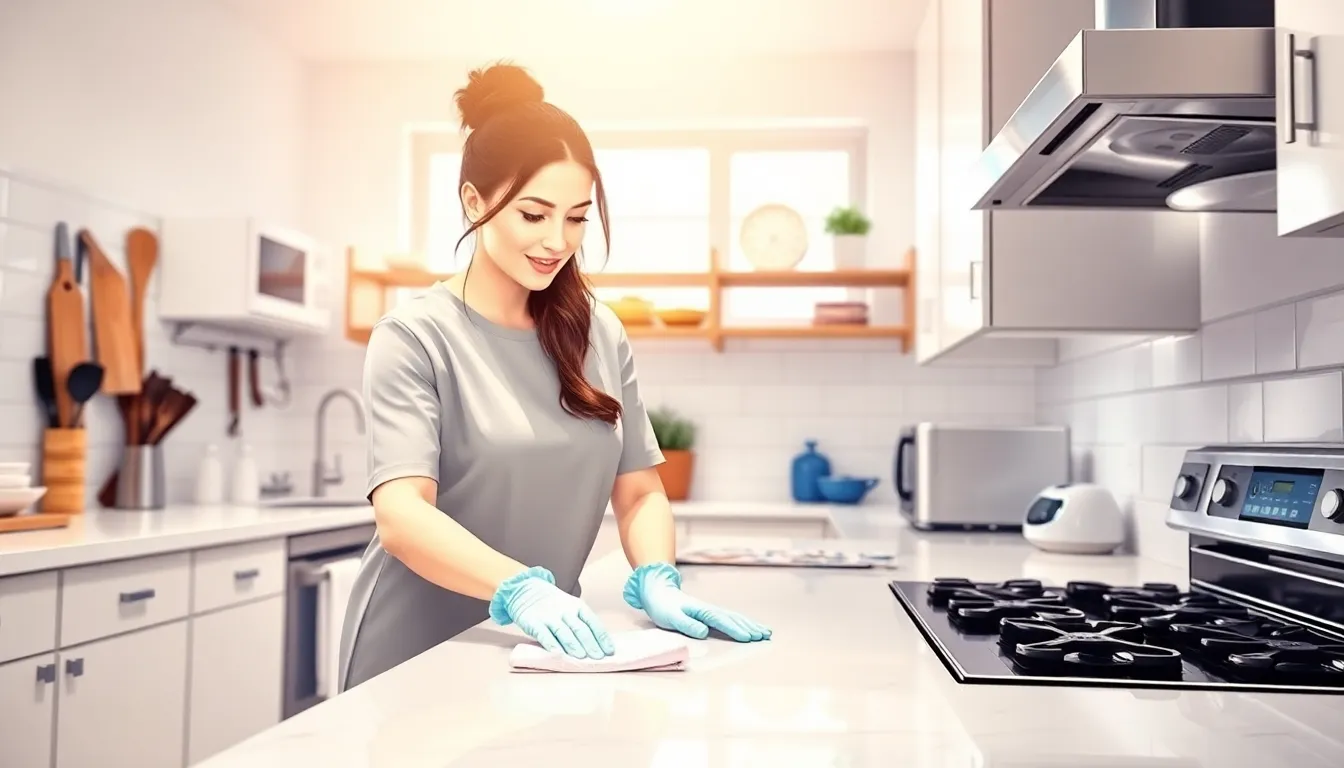Table of Contents
ToggleIn a world where germs lurk in every corner, keeping a clean home isn’t just a chore—it’s a superhero mission. Who wouldn’t want to banish dust bunnies and microscopic villains from their living space? With a few simple home hygiene tips, anyone can transform their abode into a fortress of cleanliness.
Imagine impressing guests not just with your stunning decor, but with an environment so fresh they’ll think you’ve hired a team of cleanliness ninjas. From kitchen counters to bathroom tiles, every inch deserves a little TLC. So, roll up those sleeves and get ready to tackle the grime. It’s time to turn cleaning into a fun adventure rather than a dreaded task. After all, a clean home is a happy home, and who doesn’t want that?
Importance Of Home Hygiene
Home hygiene plays a crucial role in overall health and well-being. Clean living spaces prevent the spread of germs, reducing the risk of illnesses. Each room in a home contributes to this hygiene, with kitchens and bathrooms requiring particular attention.
Regular cleaning practices eliminate dirt and contaminants. These actions create a more inviting atmosphere for family and guests. A clean kitchen, for instance, promotes food safety by minimizing bacteria on surfaces. Bathrooms, being high-traffic areas, demand diligent cleaning to avoid unpleasant odors and infections.
Implementing effective home hygiene measures can enhance indoor air quality. Clean homes often lead to fewer allergens, benefiting those with sensitivities. Greater cleanliness reduces stress and creates a more peaceful environment for residents.
Maintaining hygiene also supports mental health. Tidiness often correlates with increased productivity and focus. Individuals find it easier to relax in a clean, organized space, fostering a sense of control and well-being.
Every surface, from countertops to floors, requires regular attention. Swabbing surfaces with disinfectants kills harmful bacteria, ensuring a safer living space. Routine cleaning can transform spaces into hygienic havens.
Incorporating home hygiene tips into daily routines can raise awareness of cleanliness. These practices benefit everyone and make daily life more pleasant and healthier. Prioritizing home hygiene leads to long-lasting effects, promoting a comfortable environment for everyone.
Essential Home Hygiene Tips


Maintaining a hygienic home requires attention to detail and regular upkeep. Focusing on specific areas enhances cleanliness and promotes health.
Cleaning High-Touch Surfaces
High-touch surfaces often harbor germs and bacteria. Consider cleaning doorknobs, light switches, and remote controls daily. Use disinfectant wipes or sprays to ensure thorough sanitation. As a rule, pay special attention to surfaces that people frequently contact. Regular cleaning cuts down on the spread of illness, providing a safer living environment. Establishing a routine contributes to consistent hygiene, making it easier to maintain cleanliness.
Maintaining a Clean Kitchen
The kitchen requires special care due to food preparation activities. Wiping down countertops and stovetops should happen after each use to eliminate potential contaminants. Regularly cleaning appliances, like microwaves and refrigerators, keeps them functioning hygienically. Disposal of expired food and weekly deep cleaning of the floors and surfaces enhances sanitation. Making it a habit helps prevent attractants for pests and reduces the risk of foodborne illnesses. Keeping the kitchen clean creates an inviting space for cooking and gathering.
Tips for Specific Areas
Maintaining targeted hygiene practices in specific areas promotes a healthier home. The following tips address common spaces that require attention.
Bathroom Hygiene Practices
Inspect surfaces regularly to ensure cleanliness. Clean toilets, sinks, and showers with disinfectants to eliminate bacteria. Replace bath mats and towels frequently to avoid moisture buildup. Focus on high-touch items like faucets, knobs, and light switches, ensuring they receive daily disinfection. Ventilation also plays a key role; keeping windows open or using exhaust fans reduces humidity, which helps prevent mold growth.
Bedroom Cleanliness Tips
Dust accumulates on surfaces quickly, so clean all furniture and fixtures weekly. Wash bedding weekly in hot water to eliminate allergens. Organize closets and declutter regularly to maintain a serene environment. Additionally, vacuum carpets and rugs frequently to ensure they remain free of dust mites and debris. Keep personal items like phones and glasses clean by wiping them down daily.
Living Room Sanitation
Furniture needs attention too. Dust surfaces and vacuum upholstery every week to remove allergens and dirt. Wipe down remote controls, light switches, and doorknobs with disinfectant regularly. Organize bookshelves and entertainment units to reduce clutter, promoting a welcoming space. For carpets and rugs, regular deep cleaning helps eliminate bacteria and allergens, ensuring the living room remains a clean gathering spot for family and guests.
Best Practices for Home Hygiene
Maintaining a clean home requires consistent efforts and effective products. By following a set routine, anyone can ensure their living space remains hygienic.
Regular Cleaning Schedule
Establishing a regular cleaning schedule promotes ongoing home hygiene. Daily tasks can include wiping down high-touch surfaces like doorknobs and countertops. Weekly cleaning can focus on bathrooms and dusting common areas. Monthly deep cleans allow for more extensive tasks, such as washing windows and deep cleaning carpets. Using a checklist can help track progress and maintain consistency. Prioritizing these tasks minimizes the spread of germs and keeps environments inviting.
Use of Natural Cleaners
Choosing natural cleaners benefits both health and the environment. Ingredients like vinegar and baking soda effectively disinfect surfaces without harmful chemicals. These cleaners tackle greasy stovetops and mildew in bathrooms efficiently. They’re safe around children and pets, promoting a healthy living space. Additionally, using essential oils can provide pleasant scents during cleaning. Opting for natural solutions reduces chemical exposure while supporting sustainable practices. Prioritizing eco-friendly products contributes significantly to overall home hygiene.




